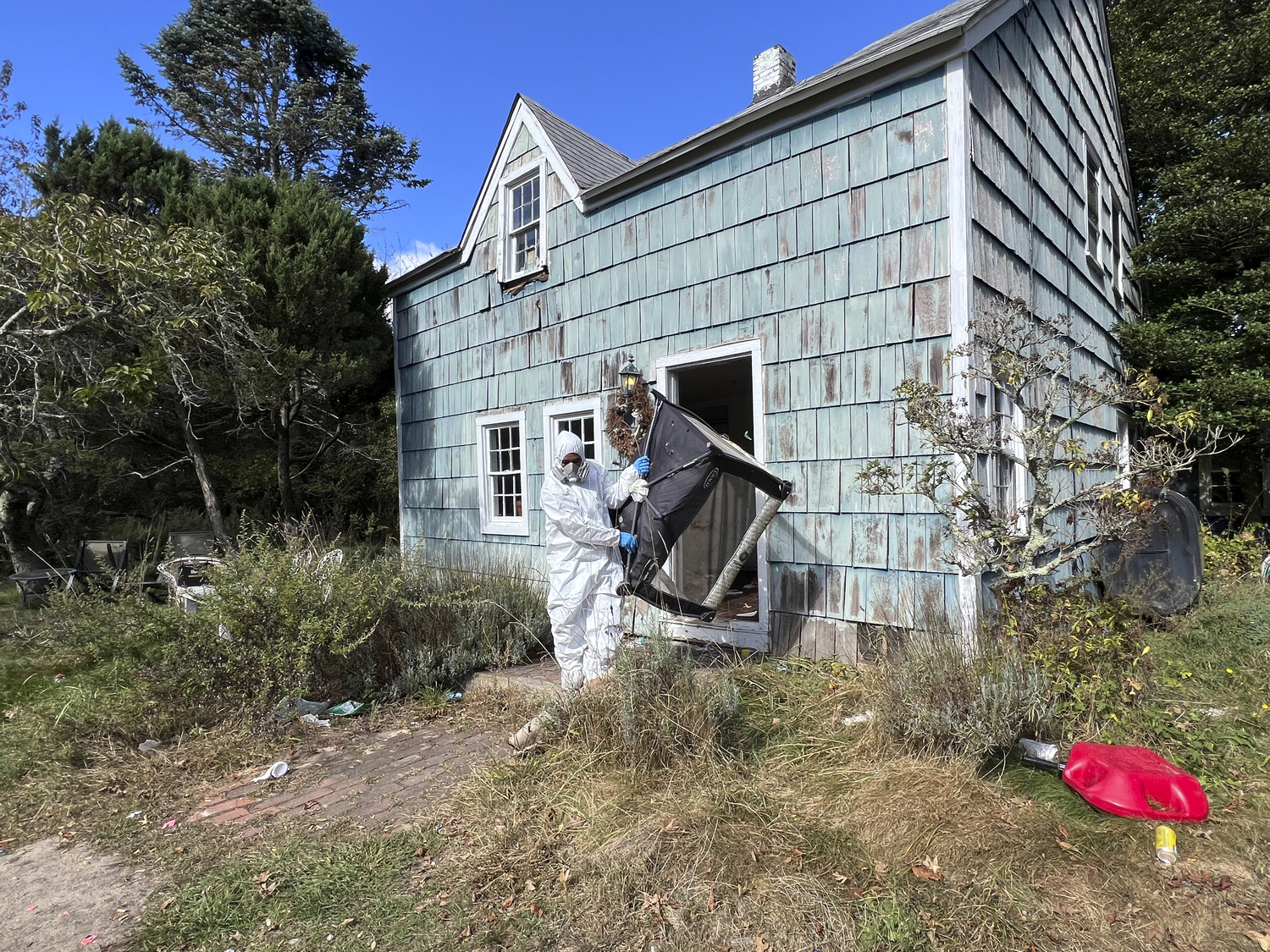
Thirteen months after he and his wife allowed a couple with four young children to use their Water Mill house for a few weeks, Arnold Dormer was finally permitted to reenter the house last Thursday. He walked into a house that had been trashed, with damaged furniture, handprints and filth all over the walls and furniture, rodent-holes left in a custom silk couch, and loose garbage on the floor of every room — as well as piled out the back door.
His, wife, Dr. Anita Dormer, explained during interviews last week that the family had been kicked out of a shelter, and she was led to believe the father was dying of cancer and unable to get the family into another shelter due to his diagnosis. The Dormers’ house was for sale, but they offered it to the family to stay in while the father underwent chemotherapy treatment in Southampton. They didn’t charge rent.
She had stayed in the house with the family a couple of times that first month. She noticed the children had written on the walls, and she said that was the first time she suggested they move. Then the Dormers’ gardener went to the house to take the plants indoors for the wintertime. The gardener found that the occupants had barred the doors and said, “It’s 30 days. You’re not going to come in here anymore.”
Thirty days is a minimum number of days someone must lawfully occupy a home in New York State to establish tenancy without a lease. Removal of a tenant requires the property owner to bring a court proceeding for eviction and obtain a judgment of possession from the court. Evicting an occupant without a court order is a class A misdemeanor in New York State.
The Dormers contacted a lawyer right away.
Anita Dormer said the house was not a rental property and they never had a lease. She had expected the family to be there for weeks, and never got the chance to remove her belongings before the occupants asserted tenant’s rights. When last Thanksgiving came, she didn’t have access to her pots and pans because they were still in the house. When winter came, she didn’t have access to her cold-weather clothes.
Despite receiving cash offers for the 4-acre property, which could potentially be subdivided for two new houses in place of the existing one, the Dormers were unable to sell it successfully while it was occupied by the unwanted tenants. It is the same property that the Village of Southampton had eyed for the site of a sewage treatment plant last year, but that plan fell apart for other reasons — including fervent opposition from neighbors.
The house did not have working heat as it was not intended for winter occupancy, but the Dormers’ attorney advised them they must fix the heat and insulate the windows.
Anita Dormer said the man who went there to fix the heat felt so badly for the children, living in squalor, that he bought 10 electric heaters.
The Dormers’ attorney advised them they must continue to pay the electricity bills or risk derailing the eviction process.
Anita Dormer reported that police were there three months ago and told her there were feces and garbage around the house. She lamented that children were living in those conditions for as long as they had been and that the authorities did not do more for the children’s welfare. The conditions were the same on eviction day last week.
When the father finally showed up to court — he did not show for the first two court dates — he agreed to clean up the property, pay the bills and move out, according to Anita Dormer.
“He showed up in court and tried to say he was dying. He wasn’t. They found out all this was a lie,” she said.
She explained that while it was true he had cancer, it was treatable, not terminal.
The agreed upon move-out date was August 1. They didn’t move out.
Anita Dormer said they called and asked for money before leaving.
“We just blocked them. We’re like, this is crazy,” she recalled.
She said she learned from Child Protective Services, which visited the house frequently but was never granted access, that with days to go before the eviction scheduled for October 10, the family left. When the occupants vacated, they left the doors open, and the television and lights on.
“We asked the sheriff if we could at least go shut the door so that people wouldn’t come in and take our things, because that’s our house and our clothing and our beds and our blankets and all kinds of things,” Anita Dormer said. “And we were told that if we step foot on that property, that it would stop the eviction, and they could move right back in.”
The Dormers were also advised that they could not remove the former occupants’ possessions themselves. They needed to hire a team to enter the house, using hazmat suits, to remove the possessions and put them by the curb.
Arnold Dormer said last Thursday that the sheriffs ultimately determined that the possessions, based on the state they were in, could be deemed trash.
Anita Dormer said they have spent more than $20,000 due to the occupants refusing to leave and trashing the house, and now the house may be condemned. She called their experience “a failure of a system that doesn’t know what to do with a situation like this.” She called for legal changes and a more aggressive approach by police and Child Protective Services.